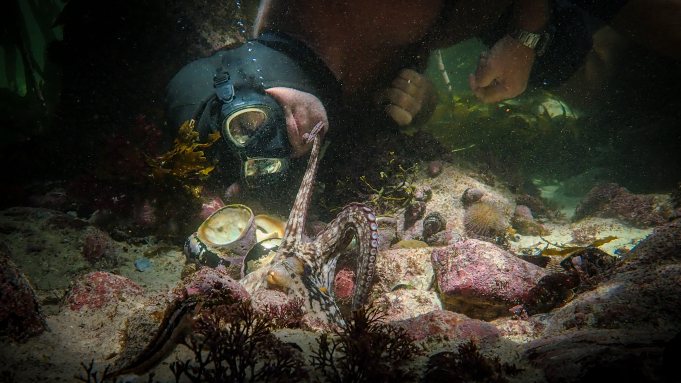

“My Octopus Teacher” and the God-shaped Hole in Every Human Heart
01/28/21
John Stonestreet Maria Baer

The new Netflix film, “My Octopus Teacher,” is hard to categorize. It’s not exactly a nature documentary, nor is it strictly narrative storytelling, and the title is strange enough by itself. Still, this movie by documentary filmmaker Craig Foster has garnered glowing reviews and has become extremely popular on social media.
The movie follows Foster, who, in the midst of a personal crisis, decides to snorkel in the kelp forest near his South African home every day for a year.
I doubt I was the only one whose first thought was, “Wow, it must be nice to have a breathtaking coastal home where personal therapy takes the form of a year of snorkeling.”
And that’s just the first thing that makes the show’s popularity puzzling–especially in this culture, which analyzes all of our problems, every political issue, and even the identity and value of individual people in terms of who has privilege and who doesn’t. Just last week, Kim Kardashian was widely panned for posting a picture of a beautiful beach with the caption “paradise,” without duly noting how privileged she was to be there. Though it’s difficult to see “My Octopus Teacher” without noting that cultural tension, it’s also refreshing to see a person with clear privilege choosing not to dwell on it.
Still, “My Octopus Teacher” isn’t a movie about privilege. It’s about, wait for it, an octopus! Foster first comes across the animal in the very early days of his year of snorkeling, and he’s mesmerized. Thanks to the engaging narration and cinematography, it’s hard not to be mesmerized along with him.
Octopi are incredible. And strange. They have this ability to go from something solid to almost liquid in a matter of seconds. The thousands of suction cups on the outside of their bodies are like a second brain. In fact, two-thirds of their cognition happen there, according to scientists.
Throughout the film, we see Foster’s octopus friend swim like a fish, walk like a dog, and play games like a kid. She changes colors. When she loses an arm in a shark attack, we watch it grow back. In simpler terms, Craig Foster’s true privilege is one that God uniquely endows on His image bearers: the opportunity to marvel at God’s extravagant creativity and the fact that He lets us live in a world like this.
The other lesson in “My Octopus Teacher” comes from Foster’s attempts to explain his obsession. “I just wanted to know this octopus,” he says. “I just wondered – what would happen if I went to the same spot, every day, for a year?” So, he does. He followed that octopus around every day, and each night, he went home to study more about her.
His obsession seems strange, to be sure, but it’s also a poignant picture of a person looking for something outside of himself in a culture where most voices tell us to look inside. Even more, what if we approached God in this way? What if we became so obsessed with knowing Him that we spent our time and energy essentially stalking Him every single day, through reading the Bible, prayer, and serving others?
And, what if we came to God with the same sense of expectation Foster had underwater? He was painfully deliberate to not impose himself in the octopus’s life. He wanted to know her, but he knew she had to decide whether to reveal herself to him. The good news is that God wants us to know Him. After all, consider the incredible lengths He has gone to in order to make Himself known, in His word, in His world, and especially in His Son.
Still, it is a particular discipline to not approach God with what Jesus called “many words” (Mt 6:7), and instead to “be still and know” that He is God (Ps 46:10).
Foster never really understood the octopus. Though God’s ways are higher than ours, and our ability to understand Him will always be limited, God is knowable. We will never know Him exhaustively, but we can know Him truthfully.
St. Augustine said, “You have formed us for Yourself, O God, and our hearts are restless until they find their rest in You.” “My Octopus Teacher” is a strange movie, but Foster’s film is a fascinating portrayal of the “God-shaped hole” in every human heart. To become obsessed with God, to follow him around like He’s the answer to our troubles, to wait for Him to show Himself to us, is the only way for our hearts to be filled and at rest.
Image sourced from Netflix
Topics
Arts & Entertainment
Christian Living
Christian Worldview
Culture/Institutions
Religion & Society
Worldview
Resources:
IMDB | September 7, 2020
Guy Lodge | Variety | December 24, 2020
Have a Follow-up Question?
Up
Next

Related Content

© Copyright 2020, All Rights Reserved.













